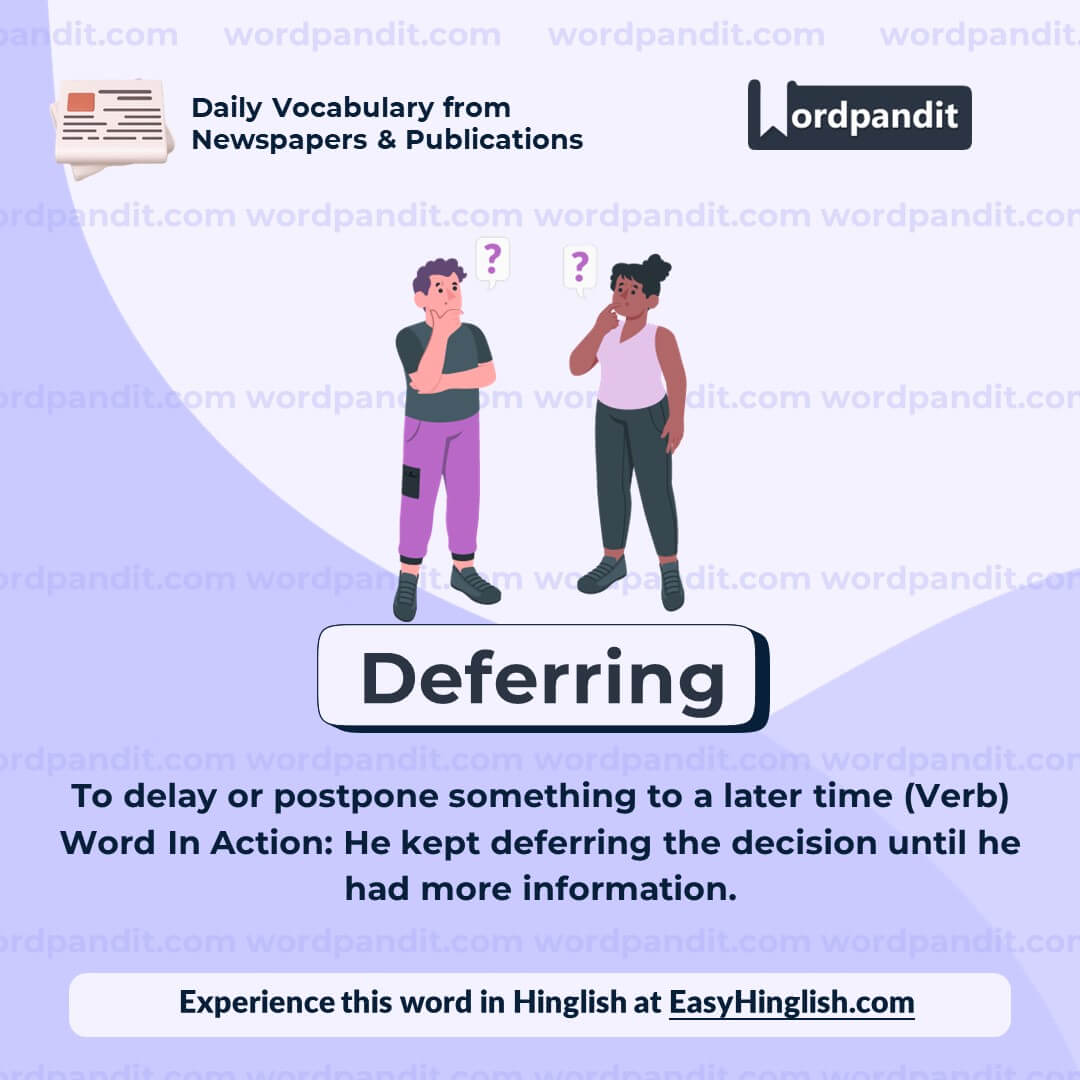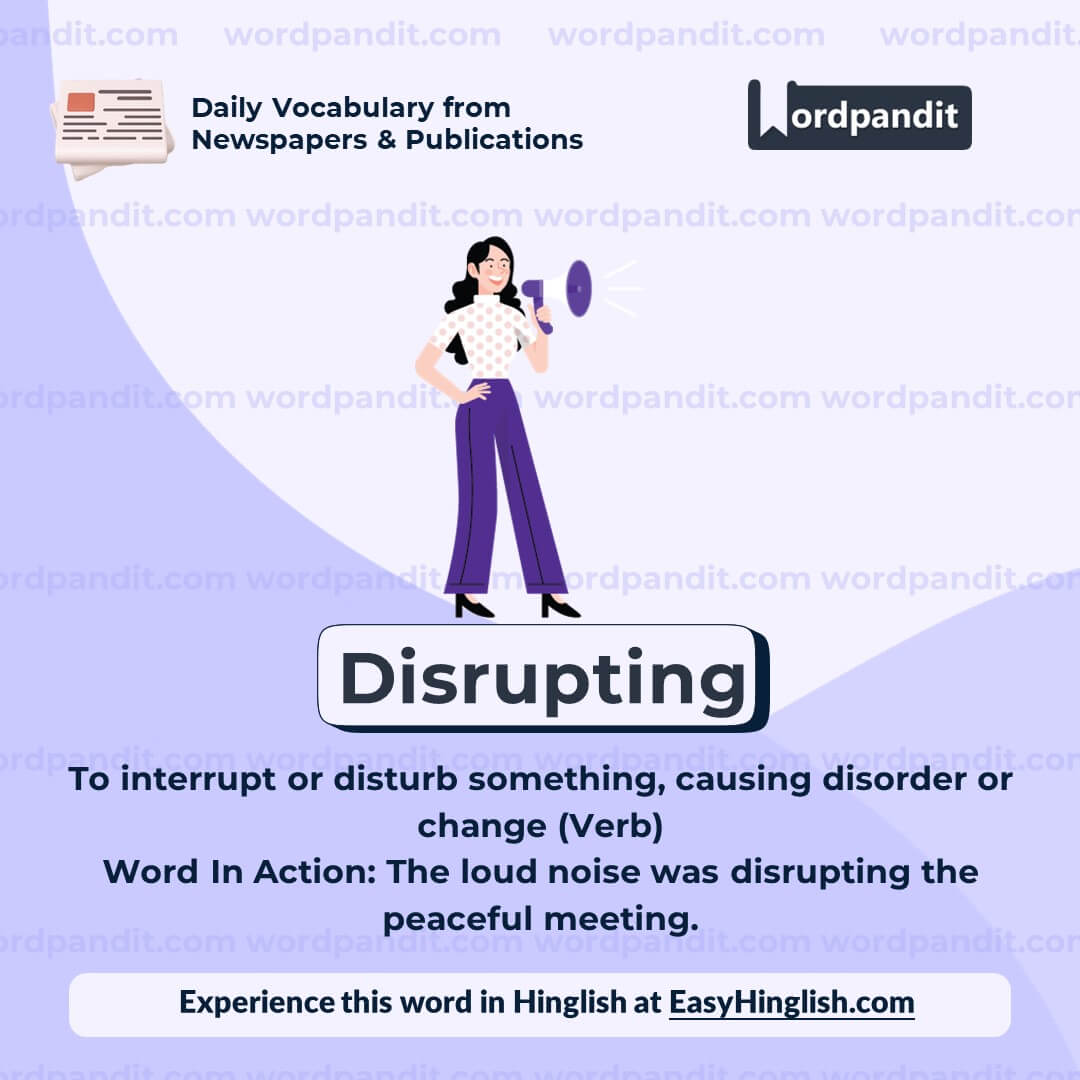Daily Vocabulary from International Newspapers and Publications
Expand Your Vocabulary with Wordpandit’s Global Vocabulary Hub
At Wordpandit, we are committed to helping you develop a truly global vocabulary by drawing from some of the most respected international publications. This section is designed to keep you ahead of the curve by introducing you to words that define global conversations and trends.
The Power of Global Sources
To help you think and communicate on a global scale, we curate vocabulary from renowned international sources, such as:
- The New York Times
- The Washington Post
- BBC
- The Guardian
- The Economist
- Scientific American
- Psychology Today
- And many more...
Stay Global, Stay Competitive
Our daily updates from international publications ensure you are consistently exposed to new words that reflect global news and developments, making sure your vocabulary is not only current but also globally relevant.
Enhance Your Global Perspective
Whether you’re preparing for international exams, aiming to excel in global business communication, or want to enhance your language skills for personal growth, Wordpandit offers the resources you need to thrive in a global context.
Effective Learning, Global Reach
Our learning methodology combines global examples, memory aids, and interactive activities, allowing you to internalize new words effectively and apply them in real-world scenarios.
Begin Your Global Vocabulary Journey Now!
Why Choose Wordpandit?
Practical Learning: Focus on words you'll actually encounter in real-world reading, enhancing your comprehension and communication skills.
Diverse Content: From current affairs to scientific breakthroughs, our varied sources expose you to vocabulary across multiple domains.
Effortless Integration: Make Wordpandit a part of your daily routine. Just a few minutes each day can significantly boost your lexicon over time.
Your Path to Vocabulary Mastery
- Visit our Daily Vocabulary section regularly
- Explore new words and their usage in context
- Practice incorporating these words into your own writing and speech
- Track your progress as your vocabulary expands
Start Your Journey Today
Embark on your vocabulary enhancement journey with Wordpandit. By consistently engaging with our daily posts, you'll build a robust vocabulary that serves you well in academic, professional, and personal contexts.
Remember, a word a day keeps linguistic limitations at bay. Make Wordpandit your daily companion in the quest for vocabulary excellence!
WORD-1: Deferring
Context:
"Sabotage is about deferring our stated goals and – when we are given a shot – blowing it, or subtly hindering our chances. The puzzle is why so many of us perpetually find ourselves getting in our own way and disrupting our best-laid plans." - Aeon
Explanatory Paragraph:
The word "deferring" refers to the act of delaying or postponing something, often intentionally. It implies putting something off to a later time, either to avoid addressing it immediately or due to external constraints. This word is commonly used in contexts where decisions or actions are temporarily set aside.
Meaning: To delay or postpone something to a later time (Verb)
Pronunciation: dih-FUR-ing
Difficulty Level: ⭐⭐ (Intermediate)
Etymology: Derived from the Latin word "differre," meaning "to carry apart, postpone," from "dis-" (apart) and "ferre" (to bear or carry).
Synonyms & Antonyms:
Synonyms: Postpone, delay, put off, adjourn, suspend
Antonyms: Advance, expedite, hasten, proceed, continue
Usage Examples:
- The committee decided on deferring the decision until they received more data.
- Instead of facing the issue, she kept deferring the confrontation with her manager.
- He is notorious for deferring tasks until the last possible moment.
- Deferring your studies for a year might be a wise decision if you want to gain work experience first.
Cultural Reference:
"Deferring gratification" is a concept often discussed in psychology, where individuals resist immediate rewards in favor of long-term benefits. This idea gained prominence through the famous "marshmallow test," which studied self-control in children. - Based on psychological research
Think About It:
When does deferring a decision become beneficial, and when does it turn into procrastination? How do we strike the right balance?
Quick Activity:
Think of one task you have been deferring lately. Write down three steps you can take to address it today. Set a timer for 15 minutes and start the first step now!
Memory Tip:
Remember "deferring" as "de-FUR-ing" — imagine a furry animal stopping mid-run, pausing or delaying its action, just like deferring delays an activity!
Real-World Application:
Deferring is often used in legal, academic, and corporate settings. For example, students might defer their university admission to gain work experience, or a company may defer a project due to budget constraints. Understanding how to strategically defer can help in managing priorities effectively.
WORD-2: Disrupting
Context:
"Sabotage is about deferring our stated goals and – when we are given a shot – blowing it, or subtly hindering our chances. The puzzle is why so many of us perpetually find ourselves getting in our own way and disrupting our best-laid plans." - Aeon
Explanatory Paragraph:
The word "disrupting" refers to interrupting or causing a disturbance to the normal flow, order, or progress of something. It often implies interference or an unexpected break in routine, which can lead to chaos or significant changes. This term is frequently used in contexts ranging from personal behavior to larger societal or technological impacts.
Meaning: To interrupt or disturb something, causing disorder or change (Verb)
Pronunciation: dis-RUP-ting
Difficulty Level: ⭐⭐ (Intermediate)
Etymology: Derived from the Latin word "disrumpere," meaning "to break apart," formed by "dis-" (apart) and "rumpere" (to break).
Synonyms & Antonyms:
Synonyms: Disturbing, interrupting, interfering, unsettling, derailing
Antonyms: Supporting, continuing, facilitating, maintaining, preserving
Usage Examples:
- The protestors were accused of disrupting the flow of traffic during rush hour.
- Technology companies are known for disrupting traditional industries with innovative solutions.
- His constant interruptions were disrupting the teacher's lecture and frustrating the other students.
- Climate change is disrupting ecosystems across the globe, forcing species to adapt or migrate.
Cultural Reference:
The term "disrupting" gained popularity in the tech world with the rise of "disruptive innovation," a concept coined by Clayton Christensen. It describes innovations that create new markets and displace existing ones, such as how streaming services disrupted traditional cable TV. - Inspired by Christensen's work
Think About It:
How can disrupting established systems lead to both progress and unintended consequences? Can you think of examples where disruption was necessary?
Quick Activity:
List two situations in your life where "disrupting" a habit or routine could lead to positive change. Write down one actionable step to start each disruption today.
Memory Tip:
Think of "disrupting" as "DIS-turb + rupt-ING" — disturbing the flow or breaking (rupt) something apart unexpectedly. Picture water suddenly breaking through a dam!
Real-World Application:
"Disrupting" is a term widely used in industries like business, technology, and education. For example, startups often aim to disrupt established markets by introducing revolutionary products or services. It also applies on a personal level, like disrupting unhealthy habits to bring about positive change.
WORD-3: Evocation
Context:
"The vivid sculpture might in fact do more to inspire visitors to further learn about the war, and ultimately the horror of all wars." - Aeon
Explanatory Paragraph:
The word "evocation" refers to the act of bringing something into the mind or memory, especially emotions, images, or ideas. It is often associated with something that stimulates the imagination or recalls vivid memories. Evocation is commonly used to describe art, literature, or music that triggers a strong emotional or mental response.
Meaning: The act of bringing a feeling, memory, or image into the mind (Noun)
Pronunciation: ev-uh-KAY-shun
Difficulty Level: ⭐⭐⭐ (Advanced)
Etymology: Derived from the Latin word "evocare," meaning "to call out" or "summon," formed by "e-" (out) and "vocare" (to call).
Synonyms & Antonyms:
Synonyms: Summoning, invocation, recollection, reminiscence, stimulation
Antonyms: Suppression, repression, forgetting, dismissal
Usage Examples:
- The poem’s imagery created a powerful evocation of childhood memories and dreams.
- The artist’s use of light and shadow resulted in an evocation of mystery and drama.
- The documentary was praised for its evocation of the struggles faced by immigrants.
- The scent of fresh flowers brought an instant evocation of her grandmother’s garden.
Cultural Reference:
Evocation is a central theme in many forms of art and literature. For example, Claude Monet’s paintings often evoke a sense of calm and beauty through his depiction of natural scenes, while writers like Edgar Allan Poe use evocation to summon feelings of suspense and terror in their stories. - Inspired by art and literature analysis
Think About It:
How does evocation differ from directly stating facts or details? Why is it often more impactful in art and storytelling?
Quick Activity:
Choose a memory from your past and write a short paragraph that evokes the emotions and images associated with it. Focus on sensory details to bring the scene to life.
Memory Tip:
To remember "evocation," think of "e-voke + action" — the word describes bringing something to life in your mind, like a memory or feeling being "called into action."
Real-World Application:
Evocation plays a significant role in marketing, storytelling, and art. For example, advertisers use evocative imagery and music to create emotional connections with their audiences. Similarly, in personal conversations, evoking shared memories can strengthen relationships and deepen connections.
WORD-4: Collate
Context:
"He took me on a dizzying screen-share tour of software he’s designed to collate the existing research on procrastination (including fMRI studies that observe the process in the brain) in order to identify underlying patterns." - Aeon
Explanatory Paragraph:
The word "collate" means to collect, compare, and organize information systematically, often with the goal of identifying patterns or drawing conclusions. It is a methodical process that ensures information is arranged in a clear, logical, or specific order, making it easier to analyze or present. This term is commonly used in academic, research, and organizational contexts.
Meaning: To collect, arrange, and compare data or information in a systematic way (Verb)
Pronunciation: kuh-LATE
Difficulty Level: ⭐⭐ (Intermediate)
Etymology: Derived from the Latin word "collatus," past participle of "conferre," meaning "to bring together," formed by "com-" (together) and "ferre" (to bring or carry).
Synonyms & Antonyms:
Synonyms: Organize, compile, assemble, compare, sort
Antonyms: Disorganize, scatter, separate, mix up
Usage Examples:
- The librarian was tasked with collating all the books on the subject into one comprehensive section.
- The researcher spent weeks collating data from multiple studies to prepare her meta-analysis report.
- The HR team collated feedback from employees to create a report on workplace satisfaction.
- The software was designed to collate financial records from different sources, making tax filing more efficient.
Cultural Reference:
Collating is a term commonly used in academia and publishing. For example, in publishing, collating refers to arranging pages of a document in the correct order. This process ensures accuracy and organization, which is vital in producing professional and scholarly works. - Based on academic practices
Think About It:
How does the process of collating information help improve decision-making? Can you think of a situation where failing to collate data might lead to mistakes?
Quick Activity:
Choose a topic you are interested in. Spend 10 minutes collating three reliable sources of information on it. Write down the common themes or patterns you observe.
Memory Tip:
Think of "collate" as "collect + relate." It helps you remember that collating involves collecting items and arranging them so their relationships become clear.
Real-World Application:
Collating is a vital skill in research, project management, and even day-to-day life. For example, teachers collate student grades to determine overall performance, businesses collate customer feedback to improve services, and individuals collate receipts to manage personal finances. Mastering this skill can enhance organization and productivity.
WORD-5: Proactive
Context:
"It is about noticing taken-for-granted social designs and erecting creative defences against powers and arrangements that chip away at one’s ability to exercise self-ownership." - Aeon
Explanatory Paragraph:
The word "proactive" describes a behavior or attitude where one takes initiative to anticipate and address potential problems or needs before they arise. Being proactive means actively taking responsibility for situations rather than simply reacting to events after they occur. It is associated with planning, foresight, and taking action to achieve positive outcomes.
Meaning: Acting in anticipation of future problems, needs, or changes; taking initiative (Adjective)
Pronunciation: proh-AK-tiv
Difficulty Level: ⭐⭐ (Intermediate)
Etymology: Formed by combining "pro-" (forward) and "active" (doing something), the term originated in the mid-20th century and became widely popular in discussions of personal and organizational development.
Synonyms & Antonyms:
Synonyms: Forward-thinking, anticipatory, prepared, initiative-taking, preemptive
Antonyms: Reactive, passive, unprepared, inattentive, complacent
Usage Examples:
- Her proactive approach to project management saved the company time and resources.
- By being proactive about your health, you can prevent many chronic illnesses before they develop.
- The school implemented a proactive strategy to address bullying by creating awareness programs.
- He is known for his proactive problem-solving skills, which make him an asset to the team.
Cultural Reference:
The concept of being proactive was popularized by Stephen R. Covey in his book *The 7 Habits of Highly Effective People*. Covey emphasized that proactivity is about taking control of your own life and actions rather than being a victim of circumstances. - Referenced from *The 7 Habits of Highly Effective People*
Think About It:
How can adopting a proactive mindset help you overcome challenges in your personal or professional life? Are there situations where being proactive might not be the best approach?
Quick Activity:
Think of one area in your life where you could be more proactive. Write down three specific actions you can take to anticipate and address potential challenges in that area.
Memory Tip:
Remember "proactive" as "pro (forward) + active" — picturing yourself actively moving forward to tackle situations before they occur, like packing an umbrella before a forecasted rainstorm.
Real-World Application:
Being proactive is crucial in various areas of life, including personal growth, workplace success, and relationships. For example, proactive employees often take initiative to improve processes or address issues, which makes them valuable team members. In personal life, being proactive about financial planning or health management can lead to long-term benefits and stability.


















